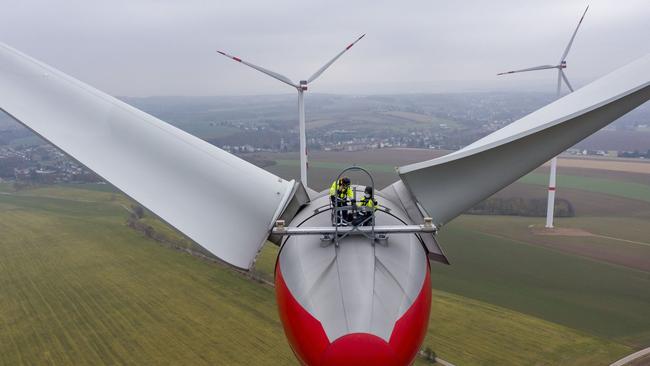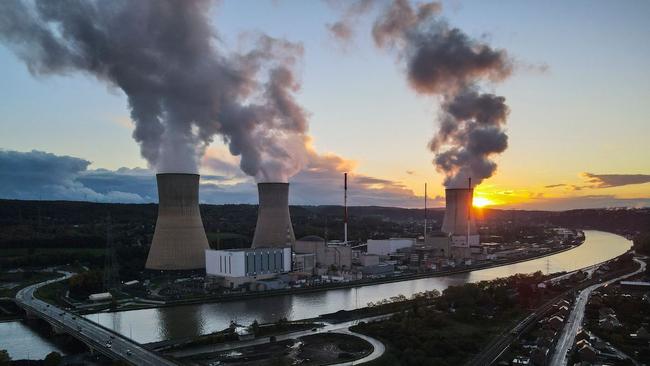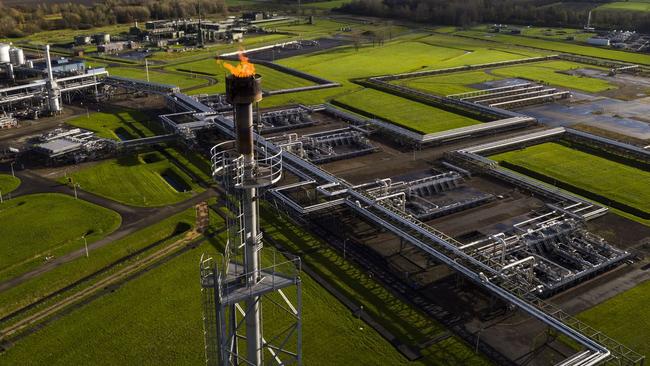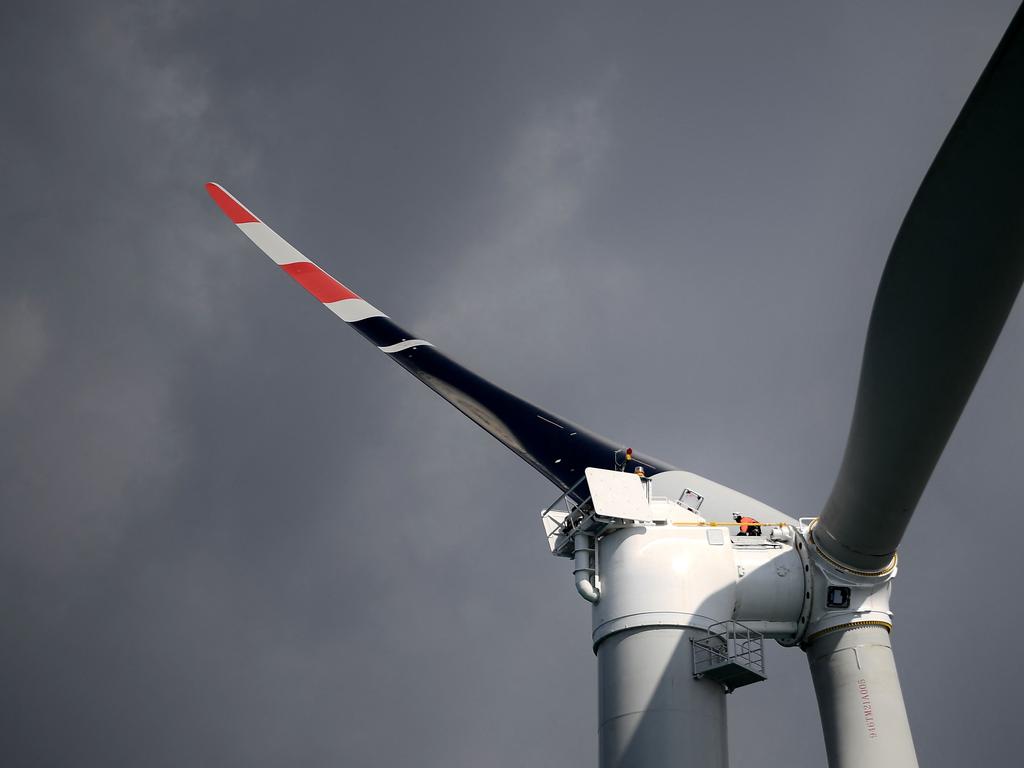Ukraine war drives countries to embrace renewable energy — but not yet
Many nations are speeding up plans to transition to green energy, while leaning even more on oil, gas and coal in the near term.

Russia’s invasion of Ukraine has led countries to tear up their timelines to transition from fossil fuels. In their quest for more secure energy supplies, they are simultaneously rushing toward and away from oil, gas and coal.
For the near term, many countries are leaning even more on fossil fuels. They are in a race to lock up enough supply from non-Russian sources, including more coal, to ensure that they can heat homes, power factories and transport goods over the next few years.
At the same time, many, especially in Europe, are accelerating plans to switch to green energy such as wind and solar power. The goal is to meet climate targets as well as permanently reduce exposure to oil and gas supplies that are geopolitically volatile. Some are revisiting nuclear power.
“It has to be a twin track,” said Louise Kingham, the UK business head for oil giant BP.
The energy shock tied to Russia’s war on Ukraine is testing nations’ resolve to rapidly reduce carbon emissions to combat global warming, as more than 190 nations have pledged to do under the Paris agreement. The international pact aims to limit global temperature increases to below two degrees Celsius by the end of the century, compared with pre-industrial levels.
The shock comes on top of rising inflation, snarled supply chains and other problems related to the pandemic that already threatened the global economy. Prices of oil, gas and other vital commodities have surged further since the outbreak of war. While European leaders have been reluctant to place sanctions on the Russian energy supplies that the continent relies on, French President Emmanuel Macron called for such a move on Monday, citing evidence of war crimes in Ukraine.
Some energy executives and advisers say the current crisis provides an overdue reality check on the challenge of replacing the fossil fuels that the world still heavily relies upon, and will likely need to meet demand for years to come.
“You can’t get renewables on stream fast enough for the pace of sanctions,” said Roberta Downey, a London-based partner with law firm Vinson & Elkins who is focused on energy infrastructure.
Among those who say the turmoil could ultimately hasten the world’s transition to cleaner energy is Larry Fink, chief executive officer of asset-management giant BlackRock Inc. “I believe that recent events will actually accelerate the shift toward greener sources of energy in many parts of the world,” he wrote in his annual letter to shareholders.
The crisis is most urgent for Europe. For years, Germany and other countries chose inexpensive Russian supplies over imports from the US and elsewhere. Russia recently provided around 40 per cent of the gas that Europe uses to heat homes and make electricity.
The US now plans to boost liquefied natural gas shipments to Europe, aiming to ship 50 billion or more cubic meters a year through at least 2030, to help meet the continent’s demand.

“We’re serious about decarbonising while providing reliable energy that doesn’t depend on foreign adversaries,” US Energy Secretary Jennifer Granholm recently told an energy conference in Houston. “That means we can walk and chew gum at the same time.”
Weaning Europe off Russian supplies remains a monumental – and expensive – task. Divorcing the European Union from Russian gas imports would require additional annual spending of at least €170bn (about $US187bn) on renewable-energy production over six years, or about 1.3 per cent of the bloc’s gross domestic product, researchers at German insurer Allianz SE estimated. Even at that price, it rated renewables as the cheapest path to European energy self-reliance.
Days after Russia’s invasion of Ukraine, German Chancellor Olaf Scholz reversed course on decades of national energy policy and said the country would build two new liquefied natural gas import terminals, boost stockpiles of the fuel and gradually shift energy purchases away from Russia. German officials have said they might prolong the use of coal-fired power plants, which the country had planned to shut down by 2030.
Germany’s Federal Ministry for Economic Affairs and Climate Action proposed speeding up a range of green-energy plans, including expansions in land and offshore wind resources and solar-power projects. The country has moved up its goal to reach almost 100 per cent renewable electricity to 2035 – 15 years ahead of its earlier target.
The war has triggered emotional pleas from European politicians and environmentalists who see Russia’s aggression as the clearest reason yet to cut use of fossil fuels that financially support President Vladimir Putin’s government.
“They don’t produce solar panels or wind turbines,” said Borislav Sandov, Bulgaria’s deputy prime minister for climate and environmental policy, of Russia. “Instead they produce fossil fuels, which we have to phase out.”
That has created new opportunities for companies and investors pitching green energy solutions, such as Australian billionaire Andrew Forrest, chairman of Fortescue Future Industries, the renewable-energy unit of miner Fortescue Metals Group.
The company said last week that it is teaming up with German energy group E. ON to supply green hydrogen to replace Russian gas, a multibillion-dollar effort to sate European energy needs with fuel made using water and Australian wind and solar power.
“The leaders I speak to say everything has changed,” Mr. Forrest said. “What many economies around the world are looking at now is accelerating completely replacing Russian fossil fuels,” he added.
In Asia, countries are more focused on limiting the economic impact of high fossil fuel prices. Japan, a top oil-and-gas importer, is shifting its energy policy toward security and affordability and away from climate, said Ryo Minami, deputy commissioner for international affairs at Japan’s Ministry of Economy, Trade and Industry.
The country remains committed to the energy transition, he said, but “with oil prices so high and the troubles in Ukraine, the weight of economics and energy security is growing.”
Companies from Japan, South Korea and elsewhere around Asia are now vying with European firms to buy US liquefied natural gas supplies, said Dan Brouillette, president of LNG exporter and infrastructure developer Sempra Infrastructure and former US energy secretary. India is taking advantage of the West’s pullback from Russian oil to buy from the country at a discount. Chinese officials are stressing the importance of ensuring there’s enough domestic production of its mainstay fuel, coal.
Many countries are reconsidering sources of energy they had hoped to retire for safety reasons.
In Belgium, government officials plan to postpone longstanding plans to decommission two 1980s-era nuclear reactors by 2025. The country had planned to replace their electrical capacity with natural-gas-fuelled power, but officials said supply uncertainties now make that move too risky.
The reactors, called Doel 4 and Tihange 3, are operated by French utility Engie SA. Engie has said that extending the reactors’ lives beyond 2025 “raises significant safety, regulatory and implementation constraints,” according to a spokesman. He said that Engie is talking with the government about costs and other details related to prolonging the reactors’ use.
Belgian officials are in discussions with Engie and aim to reach an agreement on extending the reactors’ lives by June, according to a spokesman for the Belgian energy minister. The government is also planning to build two new gas-fired plants that it says can later be used with lower-carbon energy such as hydrogen. The spokesman said those plants can help supply power while the Doel and Tihange nuclear reactors get necessary upgrades.

In the Netherlands, government officials have debated whether to increase planned production from a natural-gas field earmarked to be shut off almost entirely this year. The Groningen field, one of the world’s biggest natural-gas reserves, came under public fire after regulators and scientists linked production there to earthquakes that had damaged Dutch villages.
Dutch Prime Minister Mark Rutte said in February that the government had no plans to increase or prolong production at Groningen, but he and other officials have said those plans could be reconsidered if there’s a crisis-level gas shortage.
“We don’t think it’s wise to use Groningen, because it’s a safety hazard,” said a spokeswoman for the Dutch State Supervision of Mines, which advises government ministers on risks related to domestic natural-gas extraction.
For the longer term, officials across Europe describe a new sense of urgency and greater public support for renewable investments. Germany’s finance minister recently described renewables as “freedom energies.”
In early March, the European Commission proposed measures to double the amount of biomethane produced from agricultural waste and other sources, and roughly triple the amount of hydrogen targeted by 2030, to reduce dependence on natural gas. The commission is proposing to double the pace of deploying heat pumps — electrical devices that can replace traditional gas furnaces — and speed up widespread installation of rooftop solar systems to generate more electricity without fossil fuels.
Adding to the complexity, higher commodity prices and supply-chain issues have raised the cost of wind and solar farms, which face lengthy regulatory approval processes, lawyers and investors said. In a recent research note, Deutsche Bank AG senior economist Eric Heymann cited skilled-labour and material shortages as well as community opposition to wind farms as some of the obstacles.
The UK plans to increase investment in solar projects and offshore wind power. Officials have discussed encouraging more onshore wind farms, which in some parts of the UK have faced public and political opposition.
At a March 14 meeting with executives of offshore oil and gas producers including BP and Shell, British Prime Minister Boris Johnson discussed streamlining drilling licenses to encourage new investment and production in the North Sea, according to a government brief.
In addition, the UK has looked at extending the lifespans of coal-fired power stations slated to close in September, while still promising to drop coal for good in 2024.
Some of the proposals concern climate advocates, who oppose additional spending on fossil-fuel production.
“Energy stability in the future is not served by increased drilling,” said Jill Duggan, executive director for Europe with the non-profit Environmental Defence Fund. “It makes no sense for investors to think the immediate problem in Ukraine is a green light to invest in oil and gas.”
China, the world’s largest greenhouse gas emitter, was already wary of shifting too quickly from coal, its mainstay fossil fuel, following widespread power outages last year. Government reports following the country’s annual legislative session in March were full of references to energy security. That means “coal, coal, coal,” said Michal Meidan, director of the China energy program at the Oxford Institute for Energy Studies.
Chinese officials are closely watching whether Europe mulls a slower phase-out of coal following the Ukraine invasion, said Yan Qin, an Oslo-based senior energy and carbon analyst at financial data provider Refinitiv. Ms Qin said China contacts have asked her whether Europe is giving up on its green ambitions, to which she has answered, no.
“Exactly because fossil fuels are getting so costly now, it will only make a case to make green energy more competitive,” she said.
The Wall Street Journal


